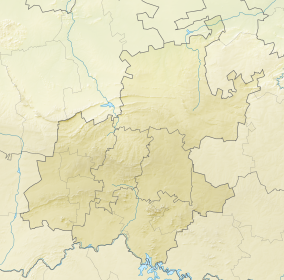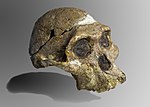From Wikipedia, the free encyclopedia
Archaeological site in South Africa
Motsetsi Cave (also known as Motsetse ) is a fossil-bearing breccia filled cavity located about 14 kilometres (8.7 mi) east of the well known South African hominid -bearing sites of Sterkfontein and Kromdraai and about 45 kilometres (28 mi) north-northwest of Johannesburg , South Africa . Motsetsi has been declared a South African National Heritage Site .[ 1]
History of investigations [ edit ] Students digging in the main excavation at Motsetse Cave. Peter Schmid, long-time collaborator is in the foreground. Motsetsi has been investigated since its discovery by Lee Berger in 1999.[ 2] University of the Witwatersrand and at times in conjunction with Peter Schmid of the University of Zurich . Only a very small part of this site has been excavated.[ 2]
Of the many thousands of fossils recovered from Motsetsi, no hominid fossils have yet been found. Many very fine fossils of other animals, however, have been discovered including the remains of very well preserved Dinofelis [ 3]
Motsetse is a series of breccia-filled dolomitic caves that formed in a fissure along a geological fault.
Various deposits of Motsetse Age of the deposits [ edit ] Motsetsi has been dated to 1.0 to 1.6 million years old based on the animals recovered.[ 3]
^ "9/2/233/0033 - Motsetse, Tweefontein 523 JQ, Gauteng" . South African Heritage Resources Agency . Retrieved 16 September 2013 .^ a b Hilton-Barber, Brett; Berger, Lee R. (2004). Field Guide to the Cradle of Humankind: Sterkfontein, Swartkrans, Kromdraai & Environs World Heritage Site ISBN 978-1-77007-065-3 ^ a b Berger, L.R.; Lacruz, R. (2003). "Preliminary report on the first excavations at the new fossil site of Motsetse, Gauteng, South Africa". South African Journal of Science . 99 (5/6): 279–283. hdl :10520/EJC97627 .
Austria Belgium Bosnia Bulgaria Croatia Cyprus Czech Republic Finland France Germany Gibraltar Greece Hungary Italy Jersey Kosovo Luxembourg Malta North Macedonia Norway Poland Portugal Romania Russia Serbia Slovakia Slovenia Spain Switzerland Ukraine United Kingdom
Afghanistan Armenia Azerbaijan Cambodia China East Timor Georgia India Indonesia Iran Iraq Israel Japan Jordan Laos Lebanon Malaysia Mongolia Myanmar Pakistan Palestine Philippines Sri Lanka Thailand Turkmenistan Turkey Uzbekistan Vietnam
Algeria Botswana Cameroon DR Congo Egypt Kenya Lesotho Libya Morocco Mozambique Namibia Nigeria Somaliland South Africa Tanzania Uganda Zambia Zimbabwe
Argentina Aruba Belize Brazil Canada Chile Colombia Cuba Curaçao Dominican Republic Jamaica Mexico Peru Suriname United States
Cityscape
Landmarks Public art
Civic Office
Residential
Structures
Urban planning Heritage conservation
Politics
Governing parties Political organisations
Political parties Trade unions Other political
Fortifications Monuments Cemeteries Historical
Historical
Companies Political Other organisations
Events
Cultural heritage Performance art Musical ensembles Theatres
Events and festivals Museums and art
Clubs and societies
SACC Anglican
Catholic
Protestant
Jewish
Islamic
Places of
Churches
Synagogues
Mosques Hindu temples Scientology centres
Mass media
Magazines
Newspapers
Radio stations Television channels
Film studios
Record labels Game studios
Cultural references
Companies
Diversified Airlines
Construction Energy Financial
Hospitality ICT Legal Manufacturing Media Mining Retail and Restaurant Services Transport State-owned
Professional Mining
Shopping centres Hotels and resorts Venues Restaurants, Tourism
Sports governing Teams
Soccer
Rugby Cricket Basketball
Equestrian sports Sports events Sports venues
Stadia and
Golf courses Equestrian Motorsports
Libraries Universities
Other tertiary Business schools Religious institutions
State schools Private schools Alternative schools International schools
Services
Hospitals
Water supply
Electricity supply
Law enforcement and Charities and NGOs
Military units and formations




